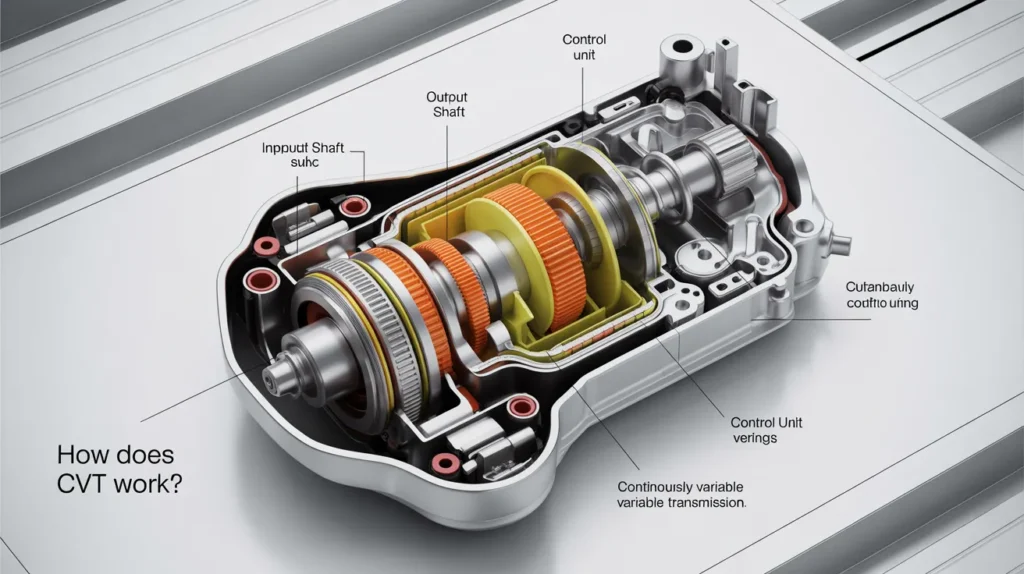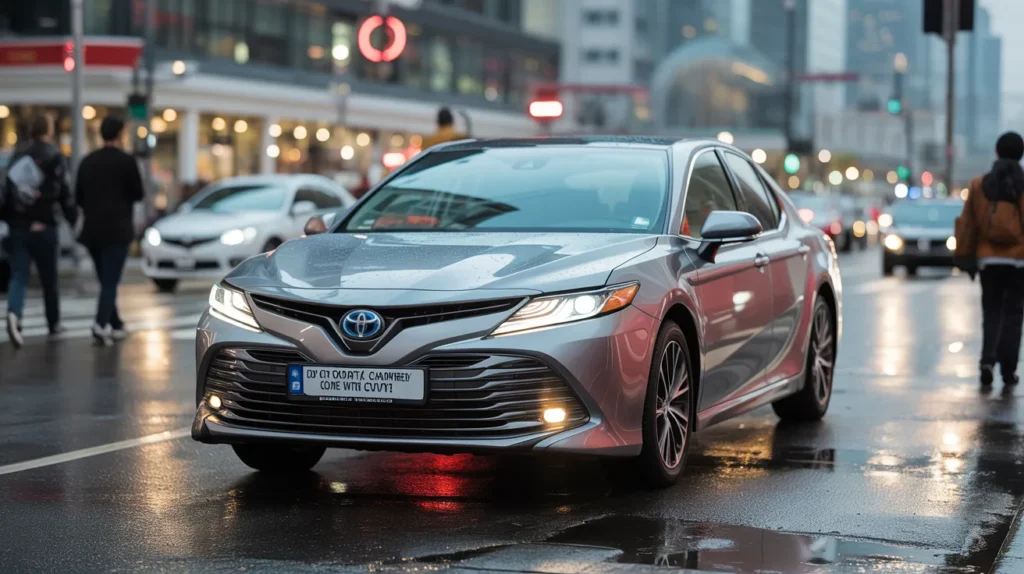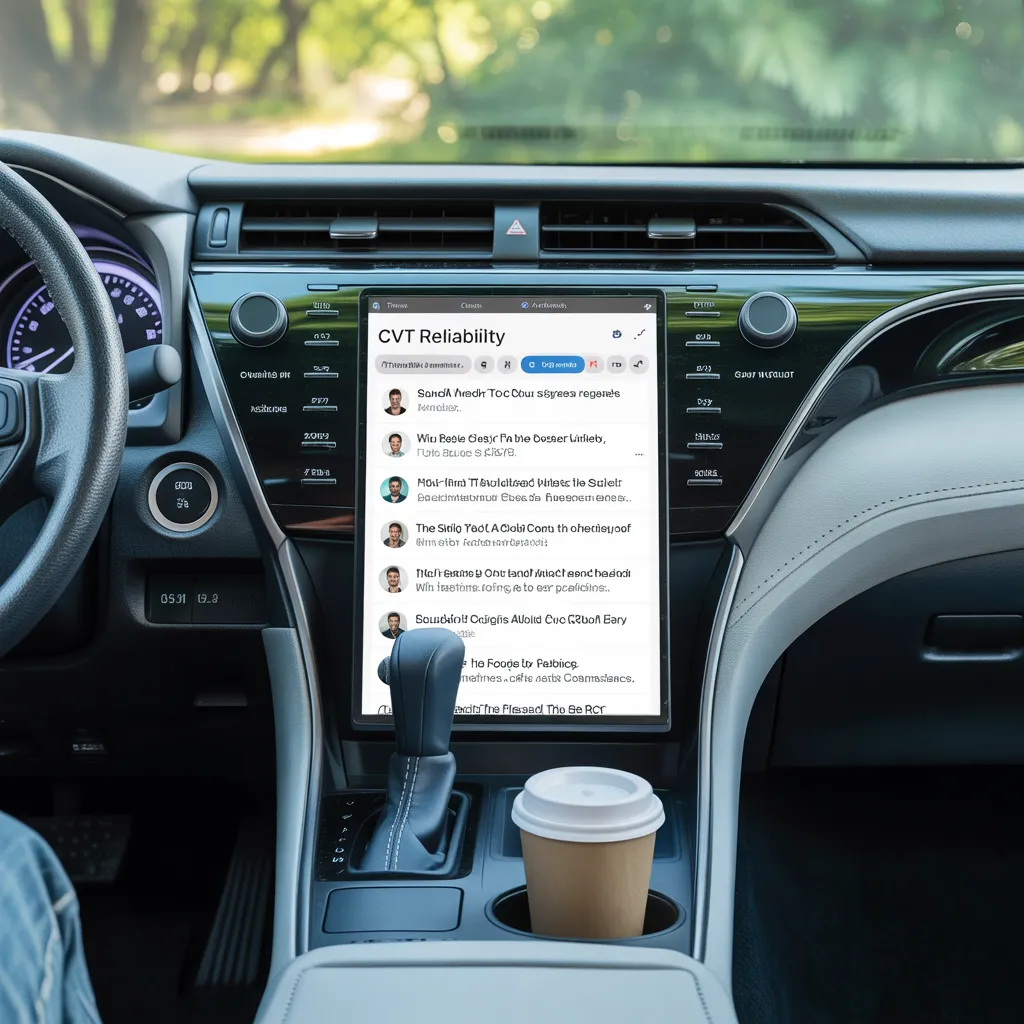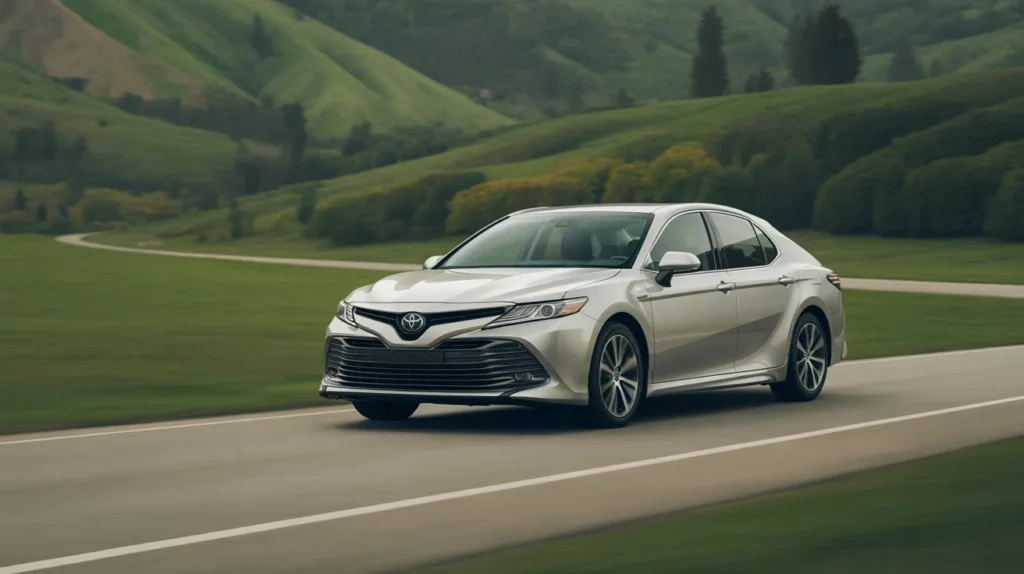Yes, most Toyota Camry models come with a CVT (Continuously Variable Transmission). This transmission type is known for providing better fuel efficiency and a smoother driving experience.
In this article, we’ll explore the role of CVT in Toyota Camrys and why it’s a significant upgrade for many drivers.
What Is a CVT Transmission?
how much does it cost to wrap a toyota camry – Join Us!
A CVT (Continuously Variable Transmission) is a type of car transmission that smoothly changes gears without the distinct shifting feeling of traditional gears. It provides better fuel efficiency and a smoother driving experience by adjusting power seamlessly.
How Does CVT Work in Cars?

A CVT (Continuously Variable Transmission) in cars works by seamlessly changing the gear ratio without steps. Unlike traditional gear systems, CVT uses a pulley and belt system. It adjusts the engine speed smoothly for better fuel efficiency and performance.
Step-by-Step Explanation:
Step 1: The engine power is transferred to a set of pulleys.
Step 2: One pulley is connected to the engine, the other to the wheels.
Step 3: A belt adjusts the position of the pulleys, changing the gear ratio.
Step 4: This allows smooth acceleration without noticeable shifting.
Step 5: The system ensures efficient power delivery, reducing fuel consumption.
What Type of Transmission Does a Toyota Camry Have?
Do Toyota Camry Hold Their Value – Check Resale Value 2025!
The Toyota Camry uses a Continuously Variable Transmission (CVT). This type of transmission offers smooth and efficient driving by seamlessly adjusting gear ratios. CVT helps in improving fuel efficiency and provides a smoother ride compared to traditional automatic transmissions. It is designed to adapt to driving conditions, ensuring optimal engine performance with minimal gear shifts.
Do All Toyota Camry Models Come with CVT?

Not all Toyota Camry models come with CVT. Some models have traditional automatic transmissions, depending on the year and trim.
For the table on Toyota Camry models and CVT:
| Model Year | CVT Available | Transmission Type |
| 2021 | Yes | CVT |
| 2020 | Yes | CVT |
| 2019 | Yes | CVT |
| 2018 | No | 8-speed Automatic |
| 2017 | No | 6-speed Automatic |
| 2016 | No | 6-speed Automatic |
| 2015 | No | 6-speed Automatic |
| 2014 | No | 6-speed Automatic |
Toyota Camry CVT: Pros and Cons:
Do Toyota Camry Hold Their Value – Check Resale Value 2025!
The Toyota Camry is well-known for its smooth driving experience, and one of the key features contributing to that is its Continuously Variable Transmission (CVT). Let’s look at the pros and cons of having a CVT in the Camry.
Pros:
Smooth Acceleration:
The CVT offers a seamless driving experience. It adjusts the engine speed smoothly, so there are no hard shifts like in traditional transmissions. This results in a smoother ride.
Better Fuel Efficiency:
The CVT allows the engine to maintain the most efficient RPM (revolutions per minute) for fuel-saving performance. This leads to improved fuel economy compared to regular automatic transmissions.
Quiet Operation:
CVTs are quieter than traditional automatic transmissions. The engine revs smoothly without the typical noise heard when gears shift.
Lower Maintenance Costs:
Because there are fewer moving parts in a CVT, maintenance tends to be less expensive over time. It requires fewer repairs compared to automatic transmissions with multiple gears.
Cons:
Less Responsive Feel:
Some drivers feel that a CVT lacks the “sporty” feel of traditional transmissions. The acceleration can feel less engaging, as it doesn’t provide the same shift points.
Potential for High-RPM Noise:
While generally quiet, during heavy acceleration, the engine may stay at high RPMs, which can create a high-pitched noise that some drivers find unpleasant.
Not as Durable in Heavy Use:
CVTs are designed for everyday driving. However, in heavy towing or sports driving, they might wear out faster than a conventional transmission.
Repairs Can Be Expensive:
If a CVT fails, it can be more costly to replace or repair. The technology is more complex, and parts are often more expensive than traditional automatic transmissions.
CVT vs. Traditional Automatic Transmission in Toyota Camry:
When choosing between CVT (Continuously Variable Transmission) and traditional automatic transmission in a Toyota Camry, it’s important to understand the differences. Here’s a breakdown of each to help you decide which is better for your needs.
1. Performance:
CVT: The CVT offers smooth acceleration and better fuel efficiency because it continuously adjusts the engine’s speed to match the optimal driving condition. There’s no shifting between gears, so the car feels more fluid when driving.
Traditional Automatic: Traditional automatic transmission shifts through fixed gears, which can sometimes cause a noticeable change in acceleration, especially at higher speeds. While not as smooth as CVT, it is reliable and offers a more familiar driving experience.
2. Fuel Efficiency:
CVT: CVT is designed to optimise fuel usage by adjusting engine speed more effectively. It helps the Camry achieve better miles per gallon (MPG), especially in city driving.
Traditional Automatic: Traditional automatics may not match the fuel efficiency of CVT systems, particularly in stop-and-go traffic. It typically consumes more fuel due to fixed gear ratios.
3. Maintenance:
CVT: While CVTs generally require less frequent maintenance, they can be more expensive to repair if something goes wrong. Over time, the belt or pulley system may wear out and need replacement.
Traditional Automatic: Traditional transmissions are well-known for their durability and easier repairs, as the parts are more widely understood. However, they may need occasional maintenance, like fluid changes, to keep them running smoothly.
4. Driving Experience:
CVT: The driving experience with a CVT is generally quieter and smoother, but some drivers find the lack of gear shifting to be less engaging or responsive, especially during high-speed driving.
Traditional Automatic: Traditional automatics offer a more engaging driving experience, especially for those who enjoy the feel of gear shifts. It’s also better for towing or driving on steep inclines, where the fixed gears can provide more power.
5. Cost:
CVT: Vehicles with CVT tend to be more affordable in terms of fuel costs, but can have higher repair costs.
Traditional Automatic: Typically, cars with traditional automatic transmissions cost a bit more upfront but have lower repair costs in the long run.
What Do Camry Owners Say About CVT Reliability?

Overall, the Toyota Camry’s CVT is widely regarded as reliable, with a few minor concerns regarding noise and acceleration. Most owners appreciate its fuel efficiency and smooth performance, making it a popular choice for long-term reliability.
Best Camry Models with CVT for Long-Term Use:
Choosing the best Toyota Camry model with CVT for long-term use depends on reliability, performance, and features that ensure durability.
Best Camry Models with CVT for Long-Term Use:
| Camry Model | Year | CVT Features | Fuel Efficiency | Reliability | Best for |
| Camry LE | 2021-2023 | Standard CVT, Smart key system | 28/39 mpg | High reliability, low maintenance | Commuting, daily use |
| Camry XLE | 2020-2023 | Enhanced interior, adaptive cruise control | 29/41 mpg | Excellent long-term durability | Comfort, family use |
| Camry SE | 2020-2023 | Sporty design, paddle shifters | 27/38 mpg | Strong engine performance | Driving enthusiasts |
| Camry Hybrid LE | 2021-2023 | Hybrid CVT system, eco mode | 51/53 mpg | Very low maintenance, eco-friendly | Eco-conscious drivers |
| Camry XSE | 2020-2023 | Sporty CVT, upgraded suspension | 27/38 mpg | Great handling, durability | Performance lovers |
Final Verdict: Should You Choose a Toyota Camry with CVT?

Choosing a Toyota Camry with CVT can be a great option if fuel efficiency, smooth driving, and low maintenance are your priorities. However, if you’re someone who enjoys a more engaging driving experience or values long-term reliability with a more familiar transmission, a traditional automatic might be a better choice.
FAQ’S
1. Does the Toyota Camry Always Have a CVT?
No, not all Toyota Camry models feature a CVT. Some older models use traditional automatic transmissions.
2. What Are the Benefits of the CVT in the Toyota Camry?
CVT provides smoother acceleration, better fuel efficiency, quieter operation, and reduced maintenance costs.
3. Is CVT Transmission Better Than Traditional Automatic for Fuel Efficiency?
Yes, CVT helps achieve better fuel efficiency by continuously adjusting the gear ratio for optimal performance.
4. Does the Toyota Camry CVT Require Frequent Maintenance?
No, CVTs generally require less maintenance compared to traditional automatic transmissions, but repairs can be costly.
5. Is the Toyota Camry Hybrid Equipped with a CVT?
Yes, the Toyota Camry Hybrid uses an eCVT, designed for better fuel efficiency and smoother performance.
Conclusion:
In conclusion, the Toyota Camry’s CVT (Continuously Variable Transmission) offers several advantages, including smooth acceleration, improved fuel efficiency, and a quieter ride. It requires less maintenance compared to traditional transmissions and provides consistent performance.
